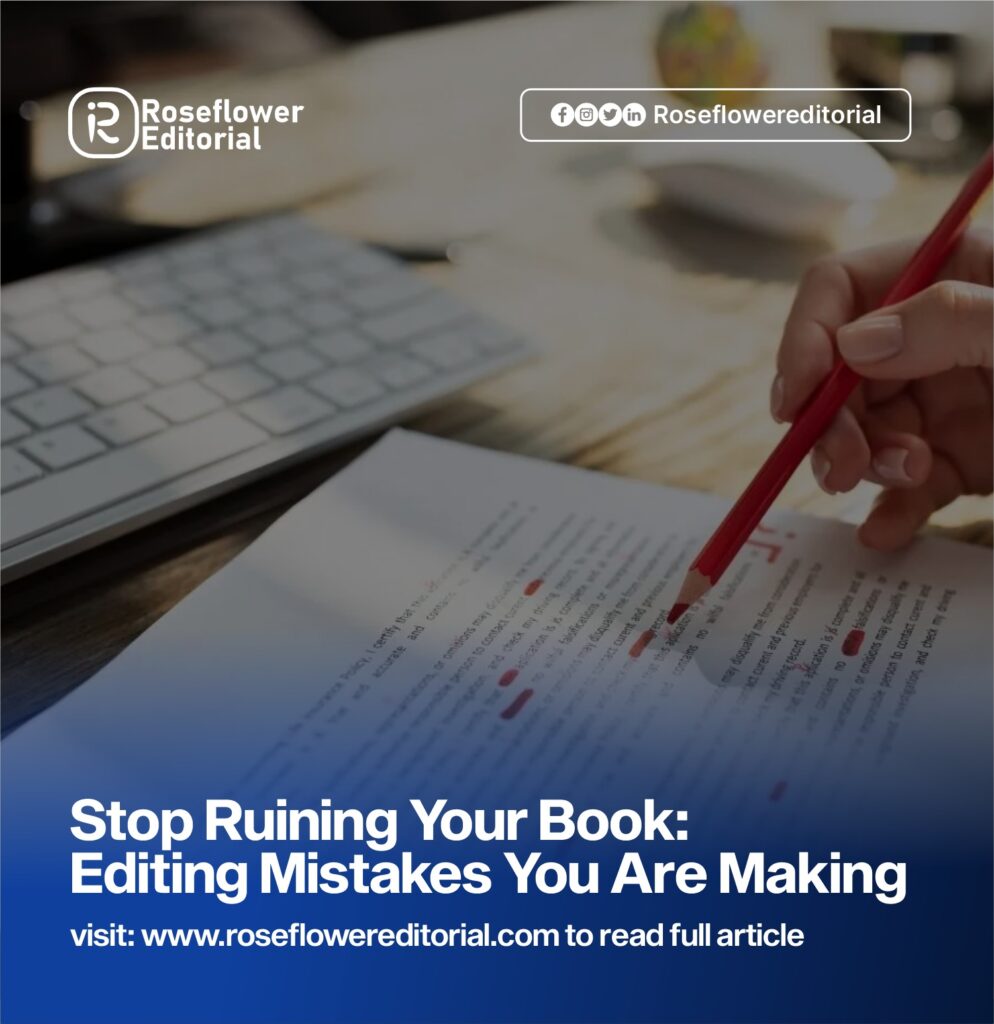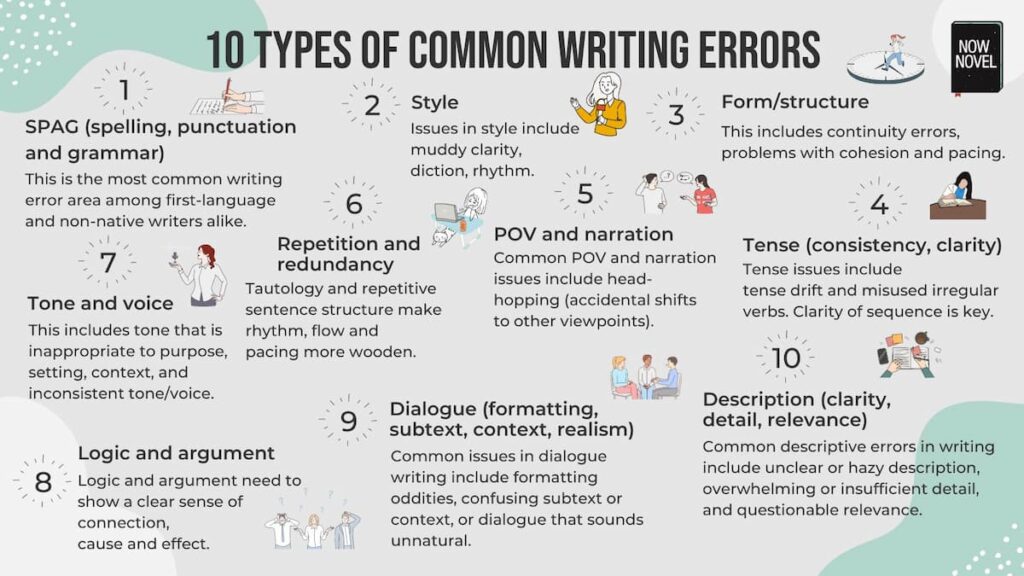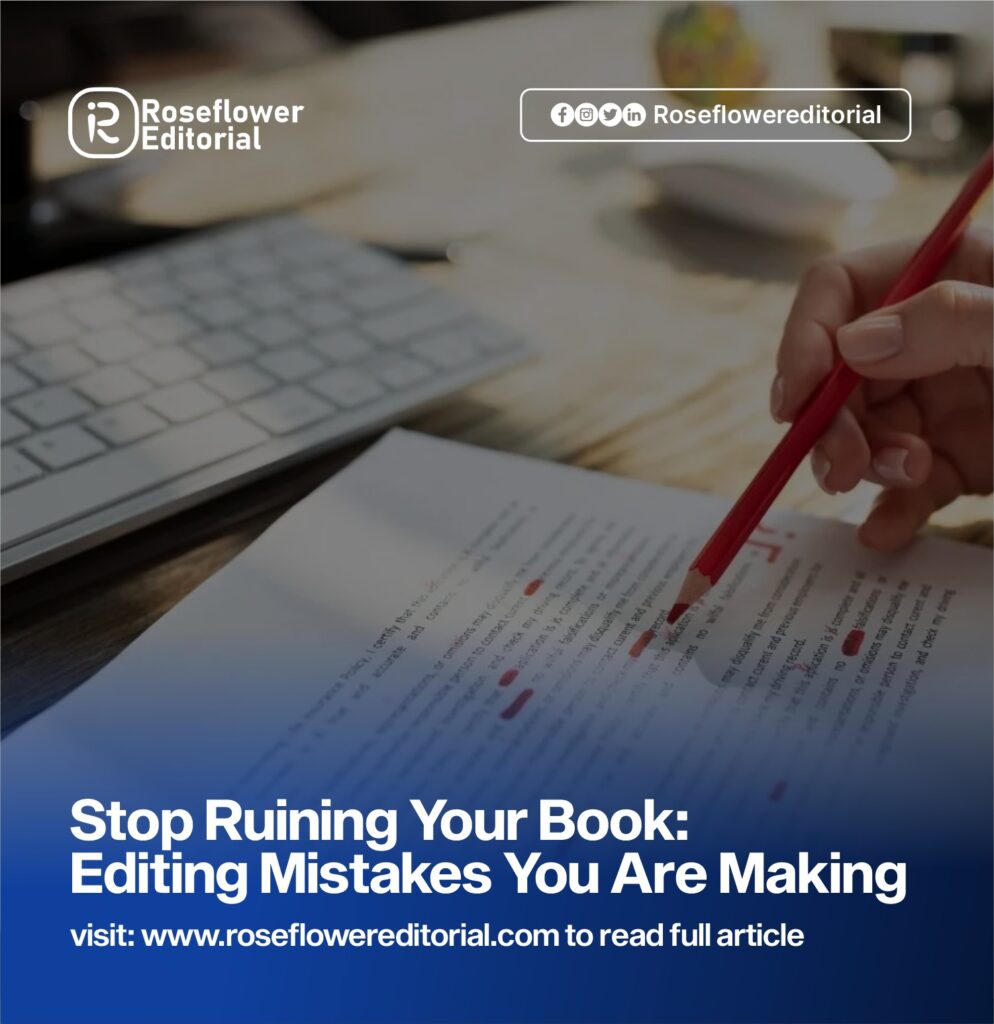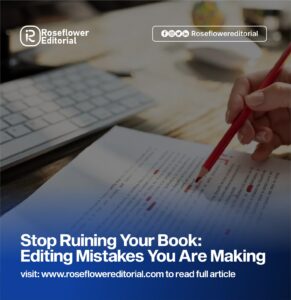
Introduction
Editing is the final and most crucial step in the writing process. Yet, many authors make editing mistakes that can ruin their hard work. Whether you’re self-editing your manuscript or working with a professional, avoiding common editing errors can make all the difference in the quality of your book. In this article, we’ll highlight the most common editing mistakes authors make and provide expert tips to help you improve your manuscript.

Common Editing Mistakes in Your Book
Ignoring Grammar and Punctuation
One of the most common editing mistakes is overlooking basic grammar and punctuation errors. Incorrect grammar or punctuation can confuse readers, disrupt the flow of the narrative, and tarnish the professionalism of your manuscript.
Tip:
Pay special attention to commas, apostrophes, and sentence structures. Tools like Grammarly can help you spot grammar mistakes and improve punctuation.
Overusing Adverbs and Weak Verbs
Another frequent mistake is relying too heavily on adverbs and weak verbs. While adverbs can add detail, overusing them often leads to weak and unpolished writing.

Tip:
Focus on strong, descriptive verbs to convey action more vividly. For example, instead of writing “she ran quickly,” try “she sprinted.” It’s more powerful and direct.
Repetition of Words and Phrases
Repetitive phrases or words can make your writing feel redundant and tiresome. Readers will quickly lose interest if they feel the content is repeating itself unnecessarily.
Tip:
Read your manuscript aloud to catch any repeated words or phrases that can be replaced with synonyms or removed entirely.
Not Fact-Checking
Authors sometimes skip fact-checking when editing. Incorrect facts, names, dates, or places can undermine the credibility of your work and turn off readers.
Tip:
Verify all facts, figures, and proper nouns in your manuscript to ensure accuracy.

Ignoring Consistency
Consistency is key in any book, especially when it comes to character names, locations, and timelines. Inconsistent writing can confuse readers and break the immersion of the story.
Tip:
Make a checklist of all major characters, settings, and timeline events. Refer to this checklist during your editing process to maintain consistency throughout your manuscript.
Skipping Proofreading
After finishing your edits, it’s essential to proofread your work. Skipping this final step can result in overlooked spelling mistakes, missing words, or awkward sentence structures.
Tip:
Take a break after editing and come back to your manuscript with fresh eyes for a more effective proofreading session.
How to Avoid Editing Mistakes in Your Book
Self-Editing Tips
Self-editing is a valuable skill for authors, but it can be tricky. To avoid the most common mistakes, you need to approach your manuscript with a critical eye.
Tip:
Use a structured self-editing checklist. Start with big-picture edits like plot and character development, then move on to sentence-level editing and, finally, proofreading.
Professional Editing Services
While self-editing is important, there’s no substitute for professional editing. An experienced editor can identify issues you might have missed, ensure consistency, and help your manuscript shine.
Tip:
Consider hiring a professional editor from services like Reedsy or Roseflower Editorial to take your manuscript to the next level.
Use Editing Software
Take advantage of modern technology to streamline your editing process. Tools like ProWritingAid and Grammarly can assist in identifying grammar errors, suggesting improvements, and enhancing the clarity of your writing.
Why Professional Editing Is Crucial
Improving Readability and Flow
A professional editor will ensure that your manuscript flows smoothly and that readers remain engaged from start to finish. They can eliminate awkward phrasing, correct syntax issues, and ensure that your writing is clear and concise.
Enhancing Your Voice
An editor doesn’t just fix mistakes—they help to enhance your voice as an author. A professional editor will help maintain the authenticity of your writing while improving its readability.
Increasing Your Book’s Marketability
Professional editing can increase your book’s chances of being picked up by publishers or being successful in self-publishing. A polished manuscript is much more appealing to potential readers and industry professionals.
Tips for Effective Manuscript Editing

Edit in Stages
Editing is not a one-step process. Break it down into manageable stages: structural edits, line edits, and proofreading. This will help you stay organized and avoid missing crucial mistakes.
Get Feedback from Others
Sometimes, authors can’t see their own mistakes. Share your manuscript with beta readers or a trusted colleague to get feedback on areas that need improvement.
Use Print and Digital Versions
While it’s easy to edit on a screen, printing out your manuscript can help you catch mistakes that might be overlooked on a computer.

Conclusion
Avoiding common editing mistakes is essential for making your manuscript the best it can be. Whether you’re editing on your own or seeking professional help, follow these tips to ensure that your book is error-free, polished, and ready for publication. If you’re struggling with editing or want a professional touch, trust Roseflower Editorial to perfect your manuscript.
Call to Action:
Don’t forget to follow us on Instagram, Facebook, LinkedIn, and our website to stay updated with the latest articles. Stay tuned for more exciting content!
If you’re struggling with editing, trust Roseflower Editorial to help perfect your manuscript. Contact us now!
In case you missed our previous article, kindly click this why proofreading services lie.
Article written by RHODA ERHABOR
Featured graphic designed by Seye Somefun













4 Responses
Avoiding common editing mistakes is essential for making your manuscript the best it can be.
Thank you Dorothy.
Editing is not a one-step process. Break it down into manageable stages: structural edits, line edits, and proofreading. This will help you stay organized and avoid making crucial mistakes. Thank you Rhoda, for this article.
Thank you Isibor. I appreciate your comment.